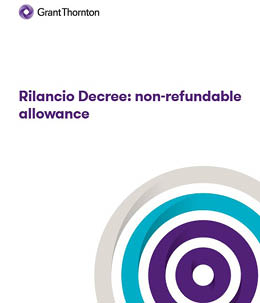Premises
Article 25 provides for the concession of a non-refundable allowance to subjects running a business activity, self-employed, and agricultural workers, having a VAT registration number and revenues or considerations lower than 5 million in the FY preceding that in which the Decree came into force and whose turnover and considerations for the month of April 2020 are lower by 2/3 compared to the turnover and considerations for the month of April 2019.
The amount of the allowance is calculated by applying a variable percentage depending on the turnover amount. The allowance is due in any case for a minimum value of 1,000 euros for individuals and 2,000 euros for entities other than individuals.
Article 25, law decree dated 19 May 2020, no. 34
The allowance is granted to subjects running a business activity, self-employed, and agricultural workers having a VAT registration number, as defined under TUIR (consolidated act on income taxes). With regard to agricultural workers, para.3 specifies that these can apply for the allowance only if their income is taxed under art.32 of TUIR. A maximum limit is provided for revenues or considerations, i.e. 5 million euros in the FY preceding that in which the Decree came into force: if such limit is exceeded, taxpayers are in any case excluded from the benefit under analysis, regardless of any subjective situation.
Moreover, the allowance is not due to:
- Subjects whose activity is already terminated at the date on which the application is filed with the Tax Authorities, as provided under para. 8 of the article under analysis;
- Public entities under art. 74 of TUIR;
- Financial intermediaries;
- Holding companies under art. 162-bis of TUIR;
- Taxpayers who are entitled to receive the 600 euro bonus provided for March 2020 under articles 27 (professionals – having a VAT registration number – and workers under a coordinated and continuative collaboration contract and registered with the so-called “Gestione separata” social security fund) and 38 (workers in the performing arts industry) of law decree dated 17 March 2020, no. 18;
- Professionals registered with mandatory social security private entities;
- Subordinate employees.
Clarifications under circular letter 15/E dated 13 June 2020
Circular letter no. 15/E of 2020 provides some interpretations of the article under examination, clarifying that individuals who run a business activity, a self-employment activity or an agricultural activity, who are at the same time also subordinate employees or receive a pension can anyway benefit from the non-refundable allowance. The same interpretation is provided for employee shareholders. Associations among professionals generating business income can also benefit from the allowance, regardless of the fact that such professionals are registered with mandatory social security funds or not.
Lastly, the circular letter expressly includes taxpayers subject to the flat-rate taxation scheme as provided under para. 54 of law no. 190/2014.
Subjects who started their activity after 1st January 2019 and M&A
Taxpayers who started their activity starting from 1st January 2019 who did not generate revenues in their start-up phase and, therefore, would have been penalized by the comparison between the turnover in April 2020 and in April 2019, can benefit from the minimum allowance equal to 1,000 euros for individuals and 2,000 euros for entities other than individuals.
Moreover, para. 6 provides that taxpayers having their tax domicile or operating office in municipalities that were already in an emergency situation due to calamities when the Covid-19 emergency arose (such as those municipalities affected by earthquakes, floods or collapses of buildings, which led to the declaration of the state of emergency) and whose turnover amount cannot be assessed due to their economic difficult situation, can also benefit from the allowance for an amount equal at least to the minimum threshold of 1,000 euros for individuals and 2,000 euros for entities other than individuals.
With regard to those subjects involved in a business restructuring operation, concluded in the period between 1st January 2019 and 30 April 2020, reference must be made to aggregate data of those entities involved in an operation ensuring business continuity (merger/demerger). As concerns progressive or regressive transformations concluded in the period between 1st January 2019 and 30 April 2020, the subject that can benefit from the allowance is that resulting from the transformation operation.
How the allowance is calculated
The amount of the allowance is calculated by applying a percentage to the difference between the amount of the turnover and of the considerations for the month of April 2020 and the amount of the turnover and considerations for the month of April 2019. The percentage is calculated basing on the revenues or fees relevant to the tax period preceding the one underway at 19 May 2020, date of entry into force of the Relaunch Decree. The following percentages have been determined:
- 20% with revenues or fees lower than or equal to Euro 400.000;
- 15% with revenues or fees exceeding Euro 400,000 and lower than or equal to Euro 1,000,000;
- 10% with revenues exceeding Euro 1,000,000 and lower than or equal to Euro 5,000,000.
Should the beneficiaries be entitled to receive an allowance which, based on the calculations above, is lower than the minimum amount or equal to zero, due to a lack of comparable data (e.g., in case of subjects which started their activity in May 2019), it is provided for that the allowance is due, in any case, for an amount not lower than Euro 1,000 for individuals and Euro 2,000 for legal persons.
How to obtain the allowance
In order to benefit from the allowance, the interested subjects need to file, only by electronical means, an application with the Revenue Office with evidence that all the prerequisites above are met. The application is to be filed starting from 15 June 2020 until 13 August 2020. Should the applicant be an heir continuing the business activity of a deceased, the application can be filed starting from 25 June and no later than 24 August 2020.
In the instruction annexed to the application form, as approved by the regulation by the Director of the Revenue Office, ref. no. 0230439/2020, are indicated in detail the boxes of the income tax return to consider as a base to calculate the amounts to be included in the application. Only in case of an allowance exceeding Euro 150,000, the application form needs to be signed digitally by the applicant and sent only via certified email to the address istanza-cfp150milaeuro@pec.agenziaentrate.it, together with the antimafia self-declaration.
Distressed businesses
The provisions contained in art. 25 apply within the limits and conditions set forth by the Communication from the European Commission of 19 March 2020 C(2020) 1863 final “Temporary Framework for State aid measures to support the economy in the current Covid-19 outbreak”, and subsequent amendments.
This communication provides for that aids cannot be granted to businesses already distresses at 31 December 2019, basing on the definition under art. 2, point 18 of the Commission Regulation (EU) no. 651/2014 of 17 June 2014. For example, should a company have lost more than a half of its capital due to losses or have an insolvency proceeding underway, it cannot access the allowance.
Our professionals would be pleased to provide you with any further information you may need.

